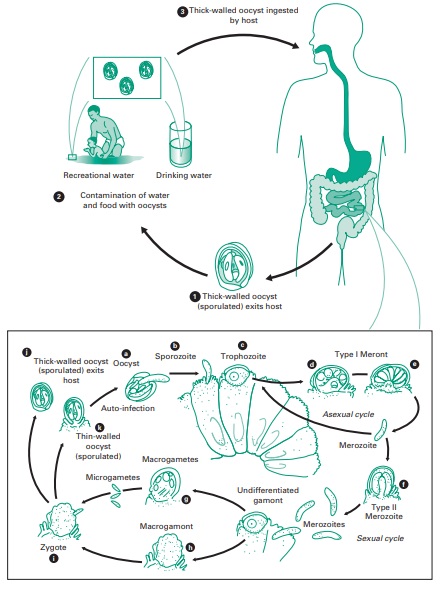Cryptosporidium parvum - Intestinal Parasites
| Home | | Pharmaceutical Microbiology | | Pharmaceutical Microbiology |Chapter: Pharmaceutical Microbiology : Protozoa
Cryptosporidium parvum is a ubiquitous coccidian parasite that causes cryptosporidiosis in humans; however, other species are known to cause infection in immunocompromised patients and in total this genus comprises 19–20 distinct species.
Cryptosporidium parvum
Cryptosporidium parvum is a ubiquitous coccidian parasite that causes cryptosporidiosis
in humans; however, other species are known to cause infection in immuno-compromised
patients and in total this genus comprises 19–20 distinct species. Recently
there has been a renaming of the major species in this group to reflect the host
specificity of the particular species or genotype. The life cycle of the
parasite is complex but is completed in a single host. Infection follows the
ingestion of oocysts associated with contaminated water or food. According to
the World Health Organization (WHO) the health significance of C. parvum is high due to the persistence
of the organism in the environment. Cattle represent the most important
reservoir of C. parvum but other
mammals, domestic and wild, can be infected and act as carriers of the disease,
even if asymptomatic. It is now known that a number of genetically distinct
subspecies exist that can be divided into two groups. Group I organisms infect
humans only (soon to be reclassified as C.
hominis); group organisms infect a wider range of hosts. There have been
several large outbreaks of this infection in the UK and USA in which water was
identified as the initial vehicle for transmission. Members of this genus are
intracellular parasites infecting the intestinal mucosal epithelium. The two
major life cycle forms are the oval oocyst and the sporozoite.
C. parvum infections are often asymptomatic, but symptoms such as profuse watery diarrhoea, stomach cramps, nausea,
vomiting and fever are typical. The symptoms can last from several days to a
few weeks in immun-ocompetent individuals, but in immuno-compromised patients
infection can become chronic, lasting months or even years. The mean infective
dose for immuno-competent people is dependent on the strain of C. parvum but it is considered to be
approximately 100 cells, and infants
are more vulnerable to infection. Diarrhoea is a major cause of childhood
mortality and morbidity as well as malnutrition in developing countries. Cryptosporidium is the third most common
cause of infective diarrhoea in children in such countries, and consequently it
plays a role in the incidence of childhood malnutrition.
Cryptosporidium infection has a higher nutritional impact in boys than girls, becausee of
the need for micronutrients in boys to build up larger muscle mass. However,
breastfeeding does offer some protection against infection. In
immuno-compromised individuals Cryptosporidium
infection causes a severe gastroenteritis, and often the parasites infect other epithelial tissues causing
pneumonia; the mortality rate due to C.
parvum in AIDS patients is between 50% and 70%. Infection occurs when
oocysts (Figure 6.2f) excyst following environmental stimuli (typical
intestinal conditions) and parasitize the epithelial cells which line the
intestine wall (Figure 6.8). After several further stages of the cycle, two
forms of oocyst are produced; soft-walled oocysts reinitiate infection of
neighbouring enterocytes while hard-walled cysts are expelled in the faeces.


Little is known about
the mechanism by which these organisms cause disease. They are known to invade
cells but this process is atypical in that the parasites form a vacuole just
below the epithelial cell membrane. During infection a variety of changes are
seen such as partial villous atrophy, crypt lengthening and inflammation; these
responses are probably due in part to cell damage that occurs during the growth
of the intracellular forms. It has also been proposed that parasite enzymes
and/or immune-mediated mechanisms may also be involved. It should be remembered,
however, that cryptosporidiosis is resolved by the immune system in healthy
patients normally within 3 weeks.
Related Topics
